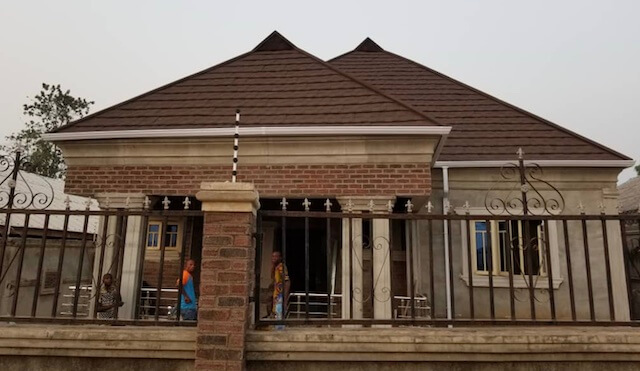In countries where pure or near-pure water is more like a luxury, people install rainwater collectors for the purpose of actually collecting rainwater for various uses. These uses include toilet flushing, home laundry, garden watering, vehicle washing, and other non-drinking purposes. Rainwater collection is also done due to other benefits such as reduction of groundwater contamination, reduction of flooding and erosion, and so on.
In Nigeria, however, water isn’t so scarce that people who can afford to build their own houses have to resort to rainwater collection. Nonetheless, more and more homeowners are fixing rainwater collectors to their roofs. Common reasons for this include beautification, prevention of damage to flooring caused by massive rain droplets, and so on.

In this article, we’d be looking at the current market prices of rainwater collectors in Nigeria and how you can acquire the required components in Nigeria without being swindled. So, if you’re looking to install a rainwater collection system on your home, you’re just on the right page.
Rainwater Collector Prices in Nigeria (White Color)
- Gutter == N4,000 per piece
- Down pipe == N3,800 per piece
- Outside corner == N1,300 per piece
- Inside corner == N1,300 per piece
- Outlet == N1,300 per piece
- Pipe connector == N950 per piece
- Gutter connector == N950 per piece
- 65-degree Elbow == N900 per piece
- 90-degree Elbow == N900 per piece
- Clip == N450 per piece
- Diverter == N900 per piece
- Hanger == N450 per piece
- End cap == N900 per piece
- Stopper == N900 per piece
Rainwater Collector Prices in Nigeria (Black & Brown Colors)
- Gutter == N4,200 per piece
- Down pipe == N4,200 per piece
- Outside corner == N1,500 per piece
- Inside corner == N1,500 per piece
- Outlet == N1,500 per piece
- Pipe connector == N1,150 per piece
- Gutter connector == N1,150 per piece
- 65-degree Elbow == N1,100 per piece
- 90-degree Elbow == N1,100 per piece
- Clip == N650 per piece
- Diverter == N1,100 per piece
- Hanger == N650 per piece
- End cap == N1,100 per piece
- Stopper == N1,100 per piece
Rainwater Collector Materials
Rainwater collector components are made of various materials, each with its pros and cons. These include aluminum, copper, steel, zinc, and PVC. In this section, we’d be looking at each of these materials and some stuff you need to know about it.
Aluminum
This is one of the most widely used materials for rainwater collector components. Aluminum rainwater collectors are lightweight and quite easy to maintain. They are resistant to corrosion and can be painted. They are available in various colors and thickness options. However, .032 and .027-gauge thickness are recommended for use in Nigeria.
Steel
Steel is stronger than aluminum but is much heavier. Another downside of this material is that it starts to rust after 5 to 10 years. It is not widely recommended because it is expensive, considering its short lifespan. However, it can be painted to prevent it from rusting, and it’s available in different color options.
Zinc
Zinc rainwater collectors are durable and long-lasting. They are not as heavy as steel options but are slightly heavier than aluminum. Zinc is favored for historic restorations and high-end residences. It is quite expensive and requires highly skilled professionals to install, as welding is required to hold components firmly together. It needs no painting and doesn’t rust over time.
Copper
Also rust-resistant, copper is preferred by those who are sticklers for seductive beauty. It is used in high-end buildings and historic restorations, as it is quite expensive. In fact, it’s the most expensive option for rainwater collectors. Copper rainwater collectors need no painting, but they must be installed by highly skilled personnel and welded to hold components together.
PVC
Polyvinyl chloride (PVC) or plastic rainwater collectors are the most widely used in Nigeria these days. This is because they are quite affordable, easy to install and require low maintenance over the long haul. PVC rainwater collectors cannot be painted, but they are available in different colors.
So, if you’re looking to install a rainwater collector that matches your roofing in color, you’ll find your preferred color on the market. Note, however, that PVC rainwater collector components are available in different grades — from the not-so-durable to the highly durable ones. So, be sure to buy yours from a trusted dealer like the one we recommend above.

